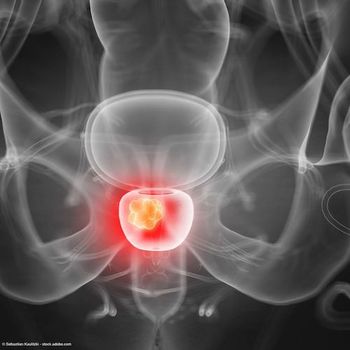
Dr. Tagawa on studies of earlier use of 177Lu-PSMA-617 in the prostate cancer paradigm
Scott T. Tagawa, MD, discusses trials exploring 177Lu-PSMA-617 in settings earlier than it’s FDA-approved indication for patients with heavily pretreated metastatic castration-resistant prostate cancer.
Scott T. Tagawa, MD, MS, FACP, discusses ongoing trials exploring 177Lu-PSMA-617 (177Lu-PSMA-617; lutetium Lu 177 vipivotide tetraxetan; Pluvicto) in settings earlier than it’s currently approved FDA indication.
Based on findings from the VISION trial, the FDA approved 177Lu-PSMA-617 in 2022 for the treatment of patients with PSMA-positive metastatic castration-resistant prostate cancer (mCRPC) who have been treated with androgen receptor pathway inhibition and taxane-based chemotherapy.
Tagawa is an associate professor of clinical medicine and clinical urology and medical director of the Genitourinary Oncology Research Program at Weill Cornell Medicine in New York City. He is also an assistant attending physician on the Cornell campus at New York-Presbyterian Hospital.
Transcript
Researchers are exploring 177Lu-PSMA-617 in earlier settings than it’s approved indication. For example, the PSMAfore (NCT04689828) trial has already read out, at least in press release form. So that is in chemo-naive mCRPC after 1 line of AR pathway inhibitor. The trial is exploring 177Lu-PSMA-617 in PSMA selected patients vs a second AR pathway inhibitor. The primary end point is radiographic progression-free survival (rPFS). Of note, the study allows for crossover. We know by the press release that the trial is positive, and hopefully we'll see the data in a few months.
And then there are also 2 other randomized studies—one randomized phase 2 and one randomized phase 3—moving another disease state earlier into the castration-sensitive or hormone-sensitive population. The phase 3, called PSMAddition (NCT04720157), is ADT plus AR pathway inhibitor, with essentially early vs delayed 177Lu-PSMA-617. The primary end point is rPFS and it also allows for crossover.
The phase 2 trial is from an Australian group that is looking at ADT/docetaxel in alone or in a sequential fashion with 177Lu-PSMA-617.
So, 177Lu-PSMA-617 looks like it's marching forward, like we do with a lot of our successfuldrugs, and I think that will further shift the treatment paradigm.
Newsletter
Stay current with the latest urology news and practice-changing insights — sign up now for the essential updates every urologist needs.






